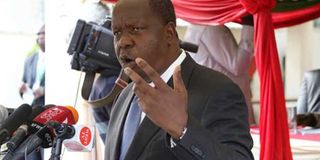News should never be twisted to suit whims of interested parties

Education Cabinet Secretary Fred Matiang'i announces the 2015 KCSE examination results in Nairobi on March 3, 2016. In a lengthy written complaint, Yusuf Diriye says the Daily Nation's lead story, published on Tuesday this week, largely focused on Muslim students and a Mandera teacher, which “appears to strengthen many Somalis’ and Muslims’ belief that the Nation Media Group is anti-Somalis and anti-Muslims and that you will do everything to demonise them”. PHOTO | JEFF ANGOTE | NATION MEDIA GROUP
What you need to know:
- How a journalist approaches a story can seriously affect how a reader understands the story and context in which it takes place.
- The frame can reinforce a stereotype or result in ethnic profiling.
- Framing comes in the process of selecting what to include in a story, what angle to pursue, which voices or issues to give prominence, and how to arrange the various components of the story.
- What a journalist or his editor chooses to include in a story can impact on how the reader understands the story and its context.
- Journalists should, therefore, choose their frames carefully so that readers like Mr Diriye do not get unintended meaning or message.
In a lengthy written complaint, Yusuf Diriye says the Daily Nation's lead story, “Revealed: How police, teachers stole exams”, published on Tuesday this week, largely focused on Muslim students and a Mandera teacher, which “appears to strengthen many Somalis’ and Muslims’ belief that the Nation Media Group is anti-Somalis and anti-Muslims and that you will do everything to demonise them”.
The front-page story was continued on pages four and five as two main composite stories.
Mr Diriye read the online versions. “I find this story, headlined “A Mandera teacher made Sh1.5 million from selling leaked exam”, particularly racist, biased and utterly unbalanced,” he says.
He says the stories lacked perspective and context to explain how deep the malaise is. Claiming, he says, without attribution, that Muslim students “established mosques” to share leaked papers is insensitive.
“Even if the so-called official report said exactly that it is not your job to parrot it, but to take it with a grain of salt. After all, you’re not the source of the information and you are not sure of the very aim of its authors, or how its information was gathered and prepared.”
Mr Diriye states that it is an open secret that leaked examination papers are distributed in almost every part of the country and it is “preposterous to even insinuate that only a Mandera teacher led the effort.”
He says that to begin the story with the sentence, “The main source of leaked national examination papers last year was a teacher in Mandera county...” is “utter falsehood because facts prove otherwise”.
He argues that in such a sensitive story, any careful editor would have looked at the bigger picture because the scandal touches almost every part of the country and also sucks in the police, the Kenya National Examinations Council, teachers, parents, and students.
“Ideally, you could have taken a little longer to dig deeper and cover the story from all its rightful angles.”
ARGUMENT FAR-FETCHED
Mr Bernard Mwinzi, who wrote the story, says the argument that the story was yet another anti-Muslim, anti-Somali narrative by the Nation is far-fetched.
“This was not a Daily Nation project. It was based on a report compiled by the police and Knec.
The Nation, therefore, only reported the findings of the report and was careful to attribute the findings to the authors. To argue that the Nation engaged in racist and biased reporting of Mandera is, at best, to argue amiss.”
On the argument that bringing the Mandera teacher on top of the story as the “main source” of leaked papers was insensitive, Mr Mwinzi argues that news is news, whether one likes it or not.
“It is not a respecter of people, faiths, regions, ideologies, or cultures. In its most balanced, truthful, and objective shape, it shouldn’t be twisted to fit the personal preferences of interested parties.
"The Knec report says the primary culprit was a teacher in Mandera; a follow-up investigation shows the police believe so too. It might not be what Mr Diriye wants to hear, and that’s just unfortunate.
"Consider, also, that the phrase ‘a teacher in Mandera’ does not necessarily mean ‘a Muslim teacher native of Mandera’. Mandera was just the scene of the commission of the wrong. Period.”
How a journalist approaches a story can seriously affect how a reader understands the story and context in which it takes place.
The frame can reinforce a stereotype or result in ethnic profiling.
Framing comes in the process of selecting what to include in a story, what angle to pursue, which voices or issues to give prominence, and how to arrange the various components of the story.
The term “framing” is taken from the idea of a frame of a picture: You can only see what is inside the frame.
What a journalist or his editor chooses to include in a story can impact how the reader understands the story and its context.
Journalists should, therefore, choose their frames carefully so that readers like Mr Diriye do not get unintended meaning or message.
Send your complaints to [email protected]. Call 3288000, mobile 0721989264





